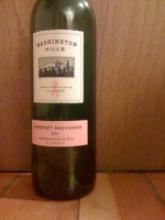Washington Hills is one of the Precept Wine brands. The Washington Hills Web site emphasizes that they've been making "award-winning" wines in Washington
state since 1989. They also describe their wines as "a brand of super-premium wines first released in 1989." The "super-premium" is code for wine that's in the vicinity of $20.00 a bottle, wine that has the potential for enjoying a year or two after purchase, versus "table wine." "Super Premium" refers, as the Washington Hills Web site puts it, to their "reserve" wines. They also produce, at the opposite end of the spectrum, their "core tier," and then somewhere near the "core tier" or consumer table wines, are the Washington Hills Chardonnay, Riesling, and Merlot "cask wines"; that's a box wine, to non-marketing folk.I've reviewed Washington Hill' 2006 Gewürtztraminer, and quite liked it. We purchased this 2007 Washington Hills Cabernet Sauvignon on a whim, lured by the fact that it's not just a Washington wine, it's a "do good" or charitable wine, with part of the price going to charities that fight breast cancer. Fall always make us think of Cabernet Sauvignon, because Cabernet Sauvignon can stand up to hearty, rich dishes and cold weather fare.
October is officially the "Breast Cancer Awareness" month in the United States. Consequently a number of chain grocery stores are featuring wines from Sutter Home, and Washington Hills, with special pink ribbons on their labels, and pink labels. Even though this was an impulse purchase, I've yet to have what I'd call a bad Washington Cabernet Sauvignon. Nonetheless, I didn't expect much from this wine; it is, after all a consumer table wine that retails for about $10.00; this bottle was purchased at Haggen, a Washington grocery chain for just under $6.00. I was quite pleasantly surprised;This Washington Hills 2007 Cabernet Sauvignon is a lovely, mellow, very clearly Washington style Cabernet Sauvignon. It was particularly interesting to compare it with the more robust and slightly-rough-around-the-edges in comparison Australian AU Coonawarra Cabernet Sauvignon. It's more blackberry than anything else in terms of fruit, with hint of black cherry. On reading the winemaker's notes, I realize why this Cabernet Sauvignon was different.
It's not, strictly speaking, a Cabernet Sauvignon. Yes, I know that that legally, as long as a wine is 70% or more a given varietal, the blended wine with the greatest proportion gets the label—and the winery does not have to specify on the label that the wine in the bottle is anything other than what's on the label. This wine is actually 84% Cabernet Sauvignon, 7% Syrah, 6 % Cabernet Franc, and 3% Merlot. The "tasting notes" also inform me that after malolactic fermentation, (hence the mellow quality), "the wine was aged with oak." Note, please the turn of phrase; "with oak," versus the more traditional "in oak." That means, I suspect that pieces of oak or oak products were suspended in the wine, rather than aging the wine in oak barrels.
This was a decent bottle of wine, one that was worth more than the just over $5.00 we paid on sale at the grocer's. We'll likely buy it again, if we see it. But it was also one of the hardest wines to find anything about; there's almost no current data on the Washington Hills Wine site at all; there's a lot that should be there and is missing (like who makes the wine? Where are the vineyards?) and I assume that at least part of that is because Washington Hills was purchased by Precept Wines. The data I was able to find on Precept's site was helpful—but the fact that I can't find anything, at all, about the special label anywhere on or off line, and the fact that all three of the email addresses I tried bounced with a dead address error, doesn't reflect well.
